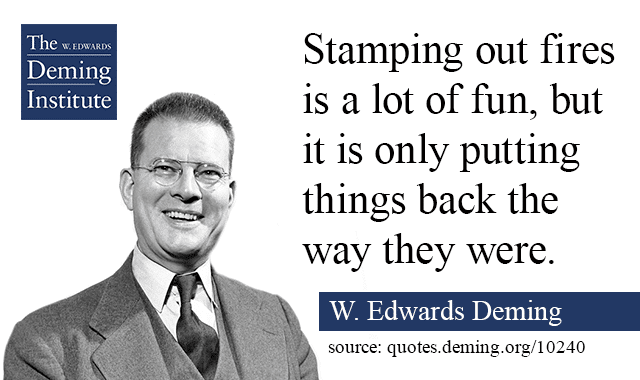Guest post by John Hunter, author of the Curious Cat Management Improvement Blog (since 2004).
In order to build strong companies that are resilient and able to prosper even in challenging times, it is best to create reliable and robust systems.
It is easy to be misled by what is flashy if we don’t think systemically. Often we reward those that heroically triumph over adversity while we overlook those who preside over calm.

But creating systems that are consistently reliable, and that avoid catastrophe, is superior to overseeing unreliable systems and having to cope with minimizing the losses that result from the inevitable problems. Yet our organizations often fail to appreciate good management. Good management is often quiet and seemingly easy. While poor management creates many opportunities to be seen heroically, avoiding even worse consequences due to the problems that poor management didn’t fix.
We need to create a culture that thinks systemically and prioritizes avoiding problems over fighting with the consequences of problems. To be clear, this doesn’t mean ignoring problems that exist. Avoiding problems is about creating systems which are continually improved to be more and more reliable thus avoiding the need for fire fighting. That is much better than creating very good fire fighters.



I would like to invite readers of this article to google for quotes on resilience. Please be assured there are many inspiring quotes. However, what is that gives rise to the idea of resilience? Adversity. Now, try to google for quotes on adversity. Those quotes may free you to see adversity in a completely new way i.e. motivational. Ny final suggestion is to google for quotes on rejection. It is said when we feel challenged, overwhelmed and similar our reptilian brain (the most powerful part) takes over and blocks our ability to reason and we feel either flight or fight or most likely just stuck. The act of curiosity – as when we google for useful quotes – restores the power to our neocortex and our ability to reason again.
The book “The Art of War” breaks down system thinking into the following components: Purpose, Landscape, Climate, Doctrine and Leadership. You may find it useful too. The trick to create robust and reliable systems is to focus on the flow: need, process that leads to intermediate objectives and then the right outcome. That would be the core process. To that we add process layers that flow in parallel and/or feed the core processes. With each process layer we create the profound knowledge (a pilot’s cockpit) as advocated by Deming. If we do that correctly, the business acumen that results will enable us to create new systems and to phase out old ones and that dynamic leadership of creation and destruction will set us free from the traditional hierarchical mindset.